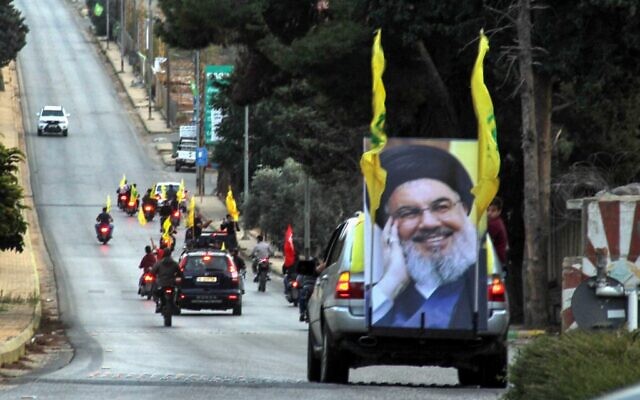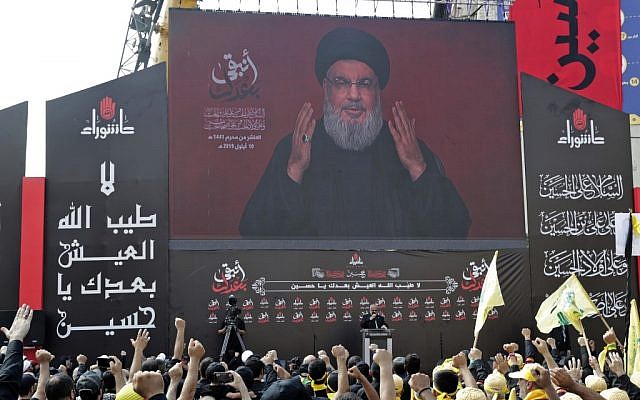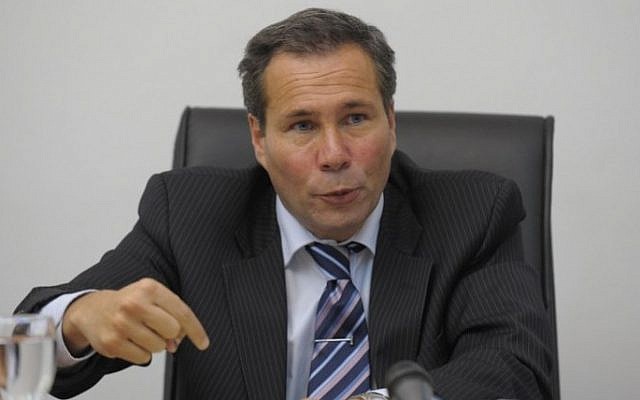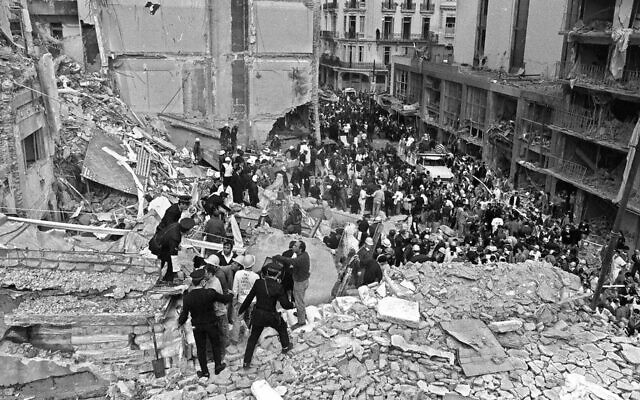Following UK’s move, Katz and Pompeo call on nations to add the political wing of Iran-backed Lebanese group to terror list

Foreign Minister Israel Katz and US Secretary of State Mike Pompeo issued separate remarks on Saturday calling on more countries to add Lebanon’s entire Hezbollah movement to their terror blacklists after the UK announced that it did so this week.
Britain’s finance ministry said on Friday that it added Hezbollah’s political wing to its list of terrorist groups subject to asset freezing. The ministry previously only targeted the Shiite organization’s military wing but has now listed the whole group after the government designated it a terrorist organization last March.
The change requires any individual or institution in Britain with accounts or financial services connected to Hezbollah to suspend them or face prosecution.
Katz said in a statement Saturday that he applauded the British government for “its decision to include all Hezbollah organizations, including the political echelon, under the legislation enabling asset freezing for terror organizations.”
The foreign minister said the move was “an achievement for Israel in its struggle against Iran and its proxies in the region, chiefly Hezbollah.”

Katz said he raised the issue in a recent discussion with British Foreign Secretary Dominic Raab and added that he expected the governments of Germany, Brazil, Australia and additional countries with which he’s had discussions to take similar steps.
Pompeo on Saturday published a tweet calling on “all nations to designate #Hizballah as the terrorist organization it is.”
The US top diplomat also marked the five-year anniversary of the death of Argentine prosecutor Alberto Nisman who was assassinated in 2015 just before he was slated to speak to a congressional panel about allegations that then-president Cristina Fernandez de Kirchner had been engaged in efforts to cover up Iranian involvement in a 1994 terror attack against the country’s Jewish community.
On this 5 year anniversary of prosecutor Alberto Nisman’s death, we remember the 1994 AMIA Jewish center attack in Buenos Aires and his tireless efforts to bring the perpetrators to justice. We call on all nations to designate #Hizballah as the terrorist organization it is.
— Secretary Pompeo (@SecPompeo) Enero 18, 2020
Nisman investigated the terror attack on the AMIA Jewish center in Buenos Aires that left 85 people dead and hundreds wounded. He established that the Iranian-backed Hezbollah terror group was responsible for the carnage and later accused Kirchner and other officials of ignoring Iran’s involvement in exchange for commercial benefits for Argentina, in violation of the country’s penal code and the independence of the judiciary.

Nisman’s body was found on January 18, 2015, hours before he was to present evidence to back up his claim. His death was initially ruled a likely suicide but an Argentine federal appeals court later found that he was murdered.
Kirchner, who was indicted in 2017 in connection with the alleged cover-up of Iran’s involvement in the bombing, denies any wrongdoing.

‘Pleased with the decision’
Earlier this week, Brian Hook, the US special representative for Iran, said the United States was “very pleased” with the UK’s decision on Hezbollah, adding that it had long been seeking such a move from European allies.
“We would like to congratulate the United Kingdom,” he told reporters in Washington. “There is no distinction between Hezbollah’s political arm and its military arm.”
Public Security Minister Gilad Erdan welcomed the move, calling it an “important step” and urged the EU and others to follow London’s example.
“Hezbollah and its Iranian backers are behind numerous attacks which have murdered innocent civilians all over the world. Europe is waking up to Iran’s terrorist activities and their murderous proxies,” Erdan said.
The Treasury in London said the change followed its annual review of the asset freezing register, and brought it into line with the 2019 decision by the interior minister to blacklist all of Hezbollah.
“The UK remains committed to the stability of Lebanon and the region, and we continue to work closely with our Lebanese partners,” a spokesman said.
Hezbollah is a Shiite movement established in 1982 during the Lebanese civil war by Iran’s Revolutionary Guard Corps.
A cross-border raid into Israel in the summer of 2006 in which the terror group captured the bodies of Israeli soldiers sparked a 34-day war where over 1,200 people died.
The group is seen as a key component of Shiite-majority Iran’s strategy for regional influence.
Britain’s move comes amid heightened tensions in the Middle East, after the US killed top Iranian general Qassem Soleimani in a drone strike earlier this month.
Tehran retaliated by firing a volley of missiles at US troops stationed in Iraqi military bases.
Britain currently proscribes 75 international terrorist organizations under terrorism legislation passed in 2000.
As reported by The Times of Israel
